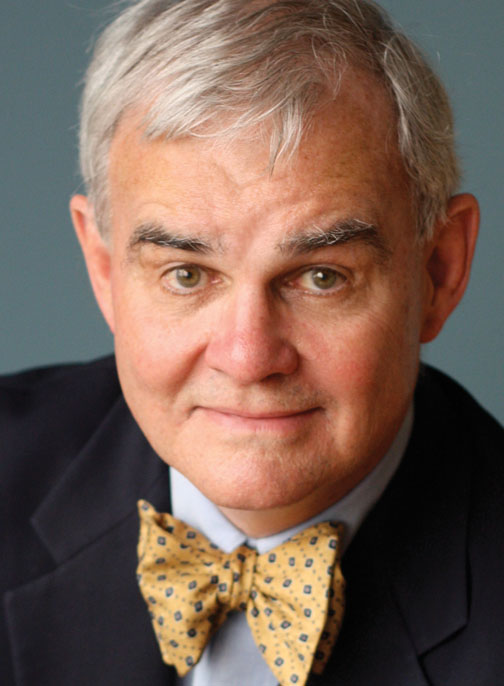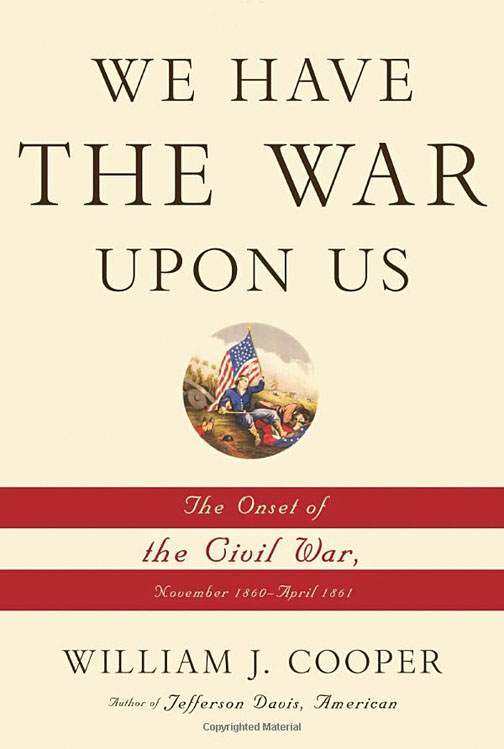A clarification about portions of Cooper’s comments appears at the end of this story.
Abraham Lincoln fundamentally misunderstood the South. He never had been to the deep South, had no Southern friends, and conferred with few Southern colleagues. His ignorance helped drive the country into the Civil War, William J. Cooper ’62 argues in his book, We Have the War Upon Us: The Onset of the Civil War, November 1860–April 1861 (Alfred Knopf).
“Lincoln didn’t see how his rhetoric inflamed the South, how his actions were interpreted,” says Cooper, the Boyd Professor of History at Louisiana State University. With a two-dimensional view of the South as a collection of wealthy slave owners with immense plantations, Lincoln did not realize that most Southerners owned few slaves, if any. Yet the institution of slavery was critically important to the whole of Southern society.
“He couldn’t conceive of a South where non-slave owners would defend slavery,” Cooper says.
A political play-by-play that traces developments from Lincoln’s election to the first shot bursting over Fort Sumter five months later, We Have the War Upon Us examines why the tradition of political compromise failed to work leading up to the Civil War.
The Republican Party was one reason. For the first time in American history, with Lincoln’s election, a party won the presidency without a single Southern state, branding itself as anti-Southern. Lincoln himself was another reason. As president-elect, he did nothing to quell Southern fears that the Union had no place for them. And third were radical secessionists in the South, whom Cooper describes as “hotheads” who overreacted to Lincoln’s election.
“There were Southerners who did not want the Union to remain whole and refused to participate in any effort to do so,” says Cooper. In the North, Republicans thought that a “move toward any sort of compromise” would mean hard-line anti-Southerners would leave their party and it would fall apart.
Ultimately, Cooper argues, the Civil War happened because of individual politicians and the choices they made. At any point before the military showdown at Fort Sumter, the war could have been avoided — if the key groups had been willing to give a bit.
What draws Cooper to the study of the Civil War is the fact that Southern politicians could not see how unnecessary secession was. On the eve of the Civil War, Southern politicians controlled the Supreme Court and the Senate. “Lincoln couldn’t have turned around without their approval,” Cooper says. While Lincoln believed that states had the right to allow slavery within their borders, he wouldn’t stand for the expansion of slavery into new territories. If the Southern politicians had sat tight for four years, says Cooper, Lincoln would not have been able to end slavery in their states. Instead, they gambled and lost.
Statements about Abraham Lincoln’s understanding of the South in an Oct. 24 Alumni Scene story about William J. Cooper ’62’s recent book, We Have the War Upon Us: The Onset of the Civil War, November 1860-April 1861, deserve clarification. As PAW readers pointed out, Lincoln took two trips, at 19 and 22, to New Orleans, and his wife and his friend Joshua Speed were Kentuckians. But as Cooper writes in the book, “that part of the Border South was all that he knew.” Lincoln had “no first-hand knowledge of the South,” Cooper writes, and “no friends who could educate him about the South and southern politics.”
What he's reading: Memoirs of John Quincy Adams: Comprising Portions of His Diary from 1795 to 1848, by John Quincy Adams, edited by Charles Francis Adams
What he likes about it: “I’m fascinated by his intellectual curiosity, his Puritan-inspired introspection, his continual beating-up on himself. He rarely does anything good enough.”














2 Responses
Anonymous
10 Years AgoFor the Record
Statements about Abraham Lincoln’s understanding of the South in an Oct. 24 Alumni Scene story about William J. Cooper ’62’s recent book, We Have the War Upon Us: The Onset of the Civil War, November 1860–April 1861, deserve clarification. As PAW readers pointed out, Lincoln took two trips, at 19 and 22, to New Orleans, and his wife and his friend Joshua Speed were Kentuckians. But as Cooper writes in the book, “that part of the Border South was all that he knew.” Lincoln had “no first-hand knowledge of the South,” Cooper writes, and “no friends who could educate him about the South and southern politics.”
Victor Woolley ’64
10 Years AgoA historical narrative returns
The following are my comments and reflections on the article by Anne Ruderman ’01 about We Have the War Upon Us: The Onset of the Civil War, November 1860-April 1861, by William J. Cooper ’62 (Alumni Scene, Oct. 24). I read it with great interest for two reasons. First, my great-grandfather, a native of Staunton, Va., in the Shenandoah Valley, served on the staff of Major General J.E.B. Stuart’s Confederate cavalry during the Civil War. Second (not surprisingly, as history repeats itself, and may we learn by that!), I found the narrative strikingly similar to the state of our nation during this election year and the great philosophical divide between the two competing political parties.
If one replaces references to “Abraham Lincoln” with “Barack Obama,” “the South/Southern” with “Republican/conservatives,” “wealthy slave owners” with “fat cats on Wall Street,” “immense plantations” with “Fortune 500 companies,” “most Southerners owned few slaves, if any” with “small business entrepreneurs,” and “hotheads” with “Tea Party activists,” you could get the following narrative describing today’s state of affairs.
Barack Obama fundamentally misunderstood Republican conservatives. He had never worked in private business nor served in the military, had no conservative friends, and conferred with few Republican colleagues. His ignorance helped drive the country into a political conflict where the tradition of political compromise failed to work.
Obama didn’t see how his rhetoric inflamed Republican conservatives, and/or how his actions were interpreted. With a two-dimensional view of conservatives as a collection of fat cats on Wall Street with Fortune 500 companies, Obama did not realize that most Republican conservatives were small-business entrepreneurs. Yet the capitalist ideals were critically important to Republican conservatives. He couldn’t conceive of a Republican Party where small-business entrepreneurs, the bulwark of the middle class, would defend free-market capitalism.
Political compromise failed to work for several reasons. The progressives were one of the reasons. Obama’s election was based on liberal bastions of the West Coast and New York/New England. As president-elect, he did nothing to quell Republican conservatives’ fears that his administration had no place for them. And third were radical reactionaries, self-described as Tea Party activists within the opposing party, who overreacted to Obama’s election. There were conservatives who did not want the Obama administration to succeed and refused to participate in any effort to do so. Republican conservatives thought that a move toward any sort of compromise would mean evangelicals would leave their party and it would fall apart.
Ultimately, this great divide happened because of individual politicians and the choices they made. At any point before the contentious 2012 election campaign, this great divide could have been avoided if the key groups had been willing to give a bit.
During Obama’s current term, the Republicans controlled the Supreme Court and, since 2010, the House. However, different from pre-Civil War days, Obama has been able to effectively get his way without Republican approval by bypassing the Constitution through extensive use of executive orders (923 to date), selectively administering the laws of Congress (border control, welfare-work mandate, etc.) and actively enhancing/expanding regulations (energy, health care, financial). “While Lincoln believed that states had the right to allow slavery within their borders,” Obama believes that states have little if any rights to secure their own borders. In some ways, the 2012 election is more important that the lead-up to the Civil War. The election is on the fundamental direction of the country, which now sits on the brink of bankruptcy – a socialist, centrally controlled economy based upon redistribution of income, compared with a capitalist system enabling more economic freedom and opportunity.